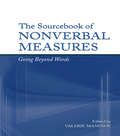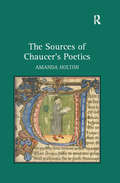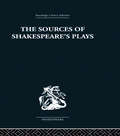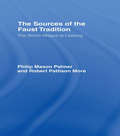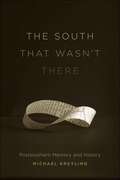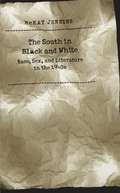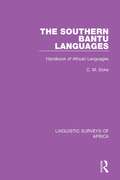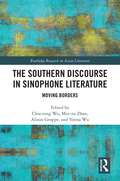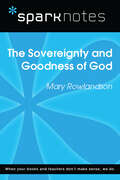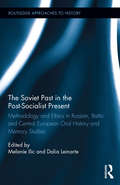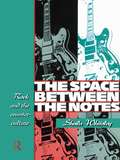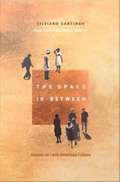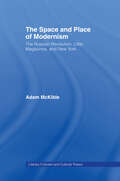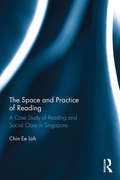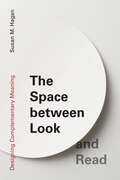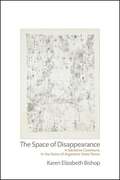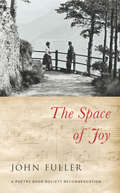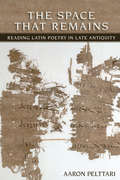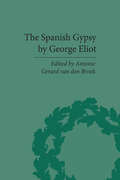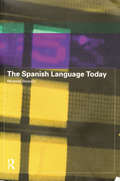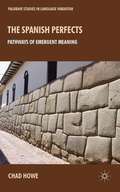- Table View
- List View
The Source Book of Short Text: The Comprehension Toolkit Language and Lessons for Active Literacy
by Stephanie Harvey and Anne GoudvisToolkit includes ready-to-teach lessons for reading comprehension. It also helps you to design your own comprehension strategy lessons to develop independent readers and learners across any content or curriculum. The teaching and learning in The Comprehension Toolkit series centers on comprehension-strategy lesson books organized around foundational comprehension strategies.
The Source for Reading Fluency
by Nancy B. SwigertThis book is designed to help students who were inaccurate readers.
The Sourcebook of Nonverbal Measures: Going Beyond Words
by Valerie ManusovThe Sourcebook of Nonverbal Measures provides a comprehensive discussion of research choices for investigating nonverbal phenomena. The volume presents many of the primary means by which researchers assess nonverbal cues. Editor Valerie Manusov has collected both well-established and new measures used in researching nonverbal behaviors, illustrating the broad spectrum of measures appropriate for use in research, and providing a critical resource for future studies.With chapters written by the creators of the research measures, this volume represents work across disciplines, and provides first-hand experience and thoughtful guidance on the use of nonverbal measures. It also offers research strategies researchers can use to answer their research questions; discussions of larger research paradigms into which a measure may be placed; and analysis tools to help researchers think through the research choices available to them.With its thorough and pragmatic approach, this Sourcebook will be an invaluable resource for studying nonverbal behavior. Researchers in interpersonal communication, psychology, personal relationships, and related areas will find it to be an essential research tool.
The Sources of Chaucer's Poetics
by Amanda HoltonFocusing on four aspects of Chaucer's poetics-use of narrative, speech, rhetoric, and figurative language-this is the first book-length study to identify Chaucer's distinctive poetic strategies by making specific comparisons with known textual sources. The author provides a combination of analysis of both poetic stylistics and sources, reading The Legend of Good Women and five of The Canterbury Tales (The Knight's Tale, The Man of Law's Tale, The Physician's Tale, The Monk's Tale, and The Manciple's Tale) against their textual sources, including Ovid's Metamorphoses and Heroides, Boccaccio's Teseida, Virgil's Aeneid, Le Roman de la Rose, and histories by Nicholas Trevet and Guido delle Colonne. Holton provides a picture of Chaucer's habits as a writer, showing that he was consistent in asserting his own techniques against the pressure of his sources and in keeping control over words and their meaning.
The Sources of Shakespeare's Plays
by Kenneth MuirFirst published in 1977. This book ascertains what sources Shakespeare used for the plots of his plays and discusses the use he made of them; and secondly illustrates how his general reading is woven into the texture of his work. Few Elizabethan dramatists took such pains as Shakespeare in the collection of source-material. Frequently the sources were apparently incompatible, but Shakespeare's ability to combine a chronicle play, one or two prose chronicles, two poems and a pastoral romance without any sense of incongruity, was masterly. The plays are examined in approximately chronological order and Shakespeare's developing skill becomes evident.
The Sources of the Faust Tradition: The Simon Magus to Lessing
by Robert P. More Philip M. PalmerFirst Published in 1966. In experience of many years in conducting a course in Goethe's Faust, trying to present to students of varied types and training the background out of which the drama grew, the compilers of this text have constantly felt the need of a collection of source material which would make that background more real and consequently more interesting. The content and form of the collection have been in part determined by its primary purpose of serving as an aid to students receiving their first serious introduction to Goethe's masterpiece and in part by the trend of Faust research. It is intended to be used as a supplement to the usual scholarly edition in the student's hands.
The South That Wasn't There: Postsouthern Memory and History (Southern Literary Studies)
by Michael KreylingOnce, history and "the South" dwelt in close proximity. Representations of the South in writing and on film assumed everybody knew what had happened in place and time to create the South. Today, our vision of the South varies, and there is less "there there" than ever before.In The South That Wasn't There, Michael Kreyling explores a series of literary situations in which memory and history seem to work in odd and problematic ways. Looking at Toni Morrison's masterpiece Beloved, he tests the viability of applying Holocaust and trauma studies to the poetics and politics of remembering slavery. He then turns to Robert Penn Warren's grapplings with his personal memory of racism, which culminated in his attempt to confront the evil directly in his book Who Speaks for the Negro? In a chapter on the court contest between Margaret Mitchell's estate and Alice Randall over Randall's parody The Wind Done Gone, Kreyling treats neglected issues such as the status of literary sequels and parody in an age of advanced commodification of the South.Kreyling's searching inquiry into the intersection of the southern warrior narrative and the shocks dealt America by the Vietnam War uncovers what appears to be the deliberate yet unconscious use of southern Civil War memory in a time of national identity crisis. He follows that up with a comparison of Faulkner's appropriation of Caribbean memory in Absalom, Absalom! and Madison Smartt Bell's in his trilogy on Toussaint Louverture and the Haitian revolution.Finally, Kreyling examines some new manifestations of southern memory, including science fiction as embodied in Octavia Butler's novel Kindred, "mockumentary" in Kevin Willmott's film C.S.A., and postmodern cinema parody in Lars Von Trier's Manderlay.Lively and frequently confrontational, The South That Wasn't There offers a thought-provoking reexamination of our literary conceptions about the South.
The South in Black and White
by Mckay JenkinsIf the nation as a whole during the 1940s was halfway between the Great Depression of the 1930s and the postwar prosperity of the 1950s, the South found itself struggling through an additional transition, one bound up in an often violent reworking of its own sense of history and regional identity. Examining the changing nature of racial politics in the 1940s, McKay Jenkins measures its impact on white Southern literature, history, and culture. Jenkins focuses on four white Southern writers--W. J. Cash, William Alexander Percy, Lillian Smith, and Carson McCullers--to show how they constructed images of race and race relations within works that professed to have little, if anything, to do with race. Sexual isolation further complicated these authors' struggles with issues of identity and repression, he argues, allowing them to occupy a space between the privilege of whiteness and the alienation of blackness. Although their views on race varied tremendously, these Southern writers' uneasy relationship with their own dominant racial group belies the idea that "whiteness" was an unchallenged, monolithic racial identity in the region.
The Southern Bantu Languages: Handbook of African Languages (Linguistic Surveys of Africa #19)
by Clement M. DokeFor the purposes of this volume, originally published in 1954, two southern zones of Bantu have been included - south of the Zambesi and east of the Kalahari. The book discusses the phonetic and morphological characteristics of these 2 zones and a classification of the groups, clusters and dialects is provided. For comparative purposes detailed information on some striking dialectical forms is given in the appendices.
The Southern Discourse in Sinophone Literature: Moving Borders (Routledge Research on Asian Literature)
by Yenna Wu Chia-Rong Wu Min-Xu Zhan Alison GroppeThis book delves into the evolving Southern discourse in Sinophone literature and explores its significance in the global context. Examining the Southern discourse not just within mainland China but also in the geographically and culturally southern regions, including Southeast Asia, Hong Kong, Macao, Taiwan, and Australia, this book analyzes various critical themes, including transnational migration, racial dynamics and stereotypes, gender politics, indigenous awareness, cultural hybridity, and global connections between the South and North. Challenging existing frameworks and providing innovative perspectives on Sinophone literature’s Southern discourse, this book will appeal to students and scholars of Chinese literature, Asian literature, and comparative literature.
The Sovereignty and Goodness of God (SparkNotes Literature Guide Series)
by SparkNotesThe Sovereignty and Goodness of God (SparkNotes Literature Guide) by Mary Rowlandson Making the reading experience fun! Created by Harvard students for students everywhere, SparkNotes is a new breed of study guide: smarter, better, faster. Geared to what today's students need to know, SparkNotes provides: *Chapter-by-chapter analysis *Explanations of key themes, motifs, and symbols *A review quiz and essay topicsLively and accessible, these guides are perfect for late-night studying and writing papers
The Soviet Past in the Post-Socialist Present: Methodology and Ethics in Russian, Baltic and Central European Oral History and Memory Studies (Routledge Approaches to History)
by Dalia Leinarte Melanie IlicThis collection examines practical and ethical issues inherent in the application of oral history and memory studies to research about the Soviet Union and Eastern Europe since the collapse of the Soviet bloc. Case studies highlight the importance of ethical good practice, including the reflexive interrogation of the interviewer and researcher, and aspects of gender and national identity. Researchers use oral history to analyze present-day recollections of the Soviet past, thereby extending our understanding beyond archival records, official rhetoric and popular mythology. Oral history explores individual life stories, but this has sometimes resulted in rather incomplete, incoherent, inconsistent or illogical narratives. Oral history, therefore, presents the researcher with a number of methodological and ethical dilemmas, including the interpretation of "silence" in biographical accounts. This collection links the discussion of oral history ethics with that of memory studies. Memories are shaped by factors that may be, simultaneously, both consecutive and disrupted. In written accounts and responses to interview questions, respondents sometimes display nostalgia for the Soviet past, or, conversely, may seek to de-mythologize the realities of Soviet rule. Case studies explore what to do when interview subjects and memoirists consciously, sub-consciously or unconsciously "forget" aspects of their own past, or themselves seek to take control of the research process.
The Space Between the Notes: Rock and the Counter-Culture
by Sheila WhiteleyThe Space Between the Notes examines a series of relationships central to sixties counter-culture: psychedelic coding and rock music, the Rolling Stones and Charles Manson, the Beatles and the `Summers of love', Jimi Hendrix and hallucinogenics, Pink Floyd and space rock. Sheila Whiteley combines musicology and socio-cultural analysis to illuminate this terrain, illustrating her argument with key recordings of the time: Cream's She Walks Like a Bearded Rainbow, Hendrix's Hey Joe, Pink Floyd's Set the Controls For the Heat of the Sun, The Move's I Can Hear the Grass Grow, among others.The appropriation of progressive rock by young urban dance bands in the 1990s make this study of sixties and seventies counter-culture a timely intervention. It will inform students of popular music and culture, and spark off recognition and interest from those that lived through the period as well as a new generation that draw inspiration from its iconography and sensibilities today.
The Space In-Between: Essays on Latin American Culture
by Silviano SantiagoSilviano Santiago has been a pioneer in the development of concepts crucial to the discourse of contemporary critical and cultural theory, especially postcolonial theory. The notions of "hybridity" and "the space in-between" have been so completely absorbed into current theory that few scholars even realize these terms began with Santiago. He was the first to introduce poststructuralist thought to Brazil--via his publication of the Glossario de Derrida and his role as a prominent teacher. The Space In-Between translates many of his seminal essays into English for the first time and, in the process, introduces the thought of one of Brazil's foremost critics and theorists of the late twentieth century. Santiago's work creates a theoretical field that transcends both the study of a specific national literature and the traditional perspectives of comparative literature. He examines the pedagogical and modernizing mission of Western voyagers from the conquistadors to the present. He deconstructs the ideas of "original" and "copy," unpacking their implications for the notions of so-called dominant and dominated cultures. Santiago also confronts questions of cultural dependency and analyzes the problems involved in the imposition of an alien European history, the cultural displacements experienced by the Indians through their religious conversion, and the hierarchical suppression of native and Afro-Brazilian values. Elegantly written and translated, The Space In-Between will provide insights and perspectives that will interest cultural and literary theorists, postcolonial scholars, and other students of contemporary culture.
The Space and Place of Modernism: The Little Magazine in New York (Literary Criticism and Cultural Theory)
by Adam McKibleThis book examines reactions to the Russian Revolution by four little magazines of the teens and twenties (The Liberator, The Messenger, The Little Review, and The Dial) in order to analyze some of the ways modernist writers negotiate the competing demands of aesthetics, political commitment and race. Re-examining interconnections among such superficially disparate phenomena as the Harlem Renaissance, Greenwich Village bohemianism, modernism and Leftist politics, this book rightly emphasizes the vitality of little magazines and argues for their necessary place in the study of modernism.
The Space and Practice of Reading: A Case Study of Reading and Social Class in Singapore (Routledge Research in Language Education)
by Chin Ee LohMirroring worldwide debates on social class, literacy rates, and social change, this study explores the intersection between reading and social class in Singapore, one of the top scorers on the Programme for International Assessment (PISA) tests, and questions the rhetoric of social change that does not take into account local spaces and practices. This comparative study of reading practices in an elite school and a government school in Singapore draws on practice and spatial perspectives to provide critical insight into how taken-for-granted practices and spaces of reading can be in fact unacknowledged spaces of inequity. Acknowledging the role of social class in shaping reading education is a start to reconfiguring current practices and spaces for more effective and equitable reading practices. This book shows how using localized, contextualized approaches sensitive to the home, school, national and global contexts can lead to more targeted policy and practice transformation in the area of reading instruction and intervention. Chapters in the book include: • Becoming a Reader: Home-School Connections• Singaporean Boys Constructing Global Literate Selves: School-Nation Connections• Levelling the Reading Gap: Socio-Spatial Perspectives The book will be relevant to literacy scholars and educators, library science researchers and sociologists interested in the intersection of class and literacy practices in the 21st century.
The Space between Look and Read: Designing Complementary Meaning
by Susan M. HaganUnleashing the potential that can be found in the space between words and images.Designers have long understood that image, text, and typeface can work together to produce new meanings, creating semiotic registers impossible to achieve with image or text alone. In The Space Between Look and Read, a study of complementary meaning in design, Susan Hagan presents a framework, called Inter-play, which explains how these new meanings emerge. Inter-play is not simply an analytical tool; it is also a method for using complementary meaning to encourage critical thinking in design audiences. Drawing from cognitive psychology, art theory, discourse analysis, design, and rhetoric, Hagan breaks down the synthesis of looking and reading into a complex series of registers, which are revealed through examples of excellent design. Thus, the book is both a theoretical exploration of how designers communicate and a casebook in communication well achieved. From the physiology of vision to the limits of language, from Allan Paivio to Uwe Loesch, The Space Between Look and Read expands our understanding of complementary design and argues that by engaging audiences through multiple cognitive registers, complementary design serves as a cognitive tool, helping audiences reach new conclusions about complex problems.
The Space of Disappearance: A Narrative Commons in the Ruins of Argentine State Terror (SUNY series in Latin American and Iberian Thought and Culture)
by Karen Elizabeth BishopMore than thirty thousand people were forcibly disappeared during the military dictatorship that governed Argentina from 1976 to 1983, leaving behind a cultural landscape fractured by absence, denial, impunity, and gaps in knowledge. This book is about how these absences assume narrative form in late twentieth-century Argentine fiction and the formal strategies and structures authors have crafted to respond to the country's use of systematic disappearance as a mechanism of state terror. In incisive close readings of texts by Rodolfo Walsh, Julio Cortázar, and Tomás Eloy Martínez, Karen Elizabeth Bishop explores how techniques of dissimulation, doubling, displacement, suspension, and embodiment come to serve both epistemological and ethical functions, grounding new forms of historical knowledge and a new narrative commons whose work continues into the twenty-first century. Their writing, Bishop argues, recalibrates our understanding of the rich and increasingly urgent reciprocities between fiction, history, and the demands of human rights. In the end, The Space of Disappearance asks us to reexamine in fiction what we think we cannot see; there, at the limits of the literary, disappearance appears as a vital agent of resistance, storytelling, and world-building.
The Space of Joy
by John FullerThe Space of Joy is a sequence of poems that recounts the endless desire for love (and the failures and compromises that accompany that desire) in a number of writers and musicians who fatally prioritise their art. It begins with Petrarch, who created great lyric poetry out of an impossible infatuation, and moves through Coleridge's self-induced guilt within domestic happiness, Matthew Arnold's disbelief in mutual love, Brahm's self-delusion and the complexities of Wallace Stevens's marriage. It so happens that both Brahms and Arnold found themselves contemplating their art and their lives in the small Swiss town of Thun, and it is Thun that provides the setting for the wonderful concluding poem of this collection in which Fuller thinks back to his own boyood and his parents' marriage. If there is any resolution in this sequence of magnificently playful and thought-provoking poems, it is the conviction that while 'poetry may be the only heaven we have', it is life itself that must create the 'space of joy' which art wishes to celebrate.Shortlisted for the Costa Poetry Award.
The Space that Remains: Reading of Latin Poetry in Late Antiquity
by Aaron PelttariWhen we think of Roman Poetry, the names most likely to come to mind are Vergil, Horace, and Ovid, who flourished during the age of Augustus. The genius of Imperial poets such as Juvenal, Martial, and Statius is now generally recognized, but the final years of the Roman Empire are not normally associated with poetic achievement. Recently, however, classical scholars have begun reassessing a number of poets from Late Antiquity—names such as Ausonius, Claudian, and Prudentius—understanding them as artists of considerable talent and influence. In The Space That Remains, Aaron Pelttari offers the first systematic study of these fourth-century poets since Michael Robert's foundational The Jeweled Style (Cornell, 1989). It is the first to give equal attention to both Christian and Pagan poetry and the first to take seriously the issue of readership. Like the Roman Empire, Latin literature was in a state of flux during the fourth century. As Pelttari shows, the period marked a turn towards forms of writing that privilege the reader’s active involvement in shaping the meaning of the text. In the poetry of Ausonius, Claudian, and Prudentius we can see the increasing importance of distinctions between old and new, ancient and modern, forgotten and remembered. The strange traditionalism and verbalism of the day often concealed a desire for immediacy and presence. We can see these changes most clearly in the expectations placed upon readers. The space that remains is the space that the reader comes to inhabit, as would increasingly become the case in the literature of the Latin Middle Ages.
The Spaces of Irish Drama
by Helen Heusner LojekLojek provides extensive analysis of space in plays by living Irish playwrights, applying practical understandings of staging and the insights of geographers and spatial theorists to drama in an era increasingly aware of space.
The Spanish Arcadia
by Javier Irigoyen-GarciaThe Spanish Arcadia analyzes the figure of the shepherd in the sixteenth- and seventeenth-century Spanish imaginary, exploring its centrality to the discourses on racial, cultural, and religious identity. Drawing on a wide range of documents, including theological polemics on blood purity, political treatises, manuals on animal husbandry, historiography, paintings, epic poems, and Spanish ballads, Javier Irigoyen-García argues that the figure of the shepherd takes on extraordinary importance in the reshaping of early modern Spanish identity.The Spanish Arcadia contextualizes pastoral romances within a broader framework and assesses how they inform other cultural manifestations. In doing so, Irigoyen-García provides incisive new ideas about the social and ethnocentric uses of the genre, as well as its interrelation with ideas of race, animal husbandry, and nation building in early modern Spain.
The Spanish Gypsy by George Eliot (The Pickering Masters)
by Antonie Gerard van den BroekIn 1864, George Eliot began writing her longest poem, "The Spanish Gypsy". This project exhausted her, and her partner took the manuscript away from her for fear it was making her ill. This work explains what Eliot read to research the poem, which parts caused her particular problems and summarises the poem's critical reception.
The Spanish Language Today
by Miranda StewartThe Spanish Language Today describes the varied and changing Spanish language at the end of the twentieth century. Suitable for introductory level upward, this book examines:* where Spanish is spoken on a global scale* the status of Spanish within the realms of politics, education and media* the standardisation of Spanish* specific areas of linguistic variation and change* how other languages and dialects spoken in the same areas affect the Spanish language* whether new technologies are an opportunity or a threat to the Spanish language.The Spanish Language Today contains numerous extracts from contemporary press and literary sources, a glossary of technical terms and selected translations.
The Spanish Perfects: Pathways of Emergent Meaning (Palgrave Macmillan Studies in Language Variation)
by Chad HoweThis book considers the role of cross-dialectal data in our understanding of linguistic variability, focusing on the widely discussed dichotomy between past tense forms and relying primarily on spoken language data from different varieties of Spanish.


